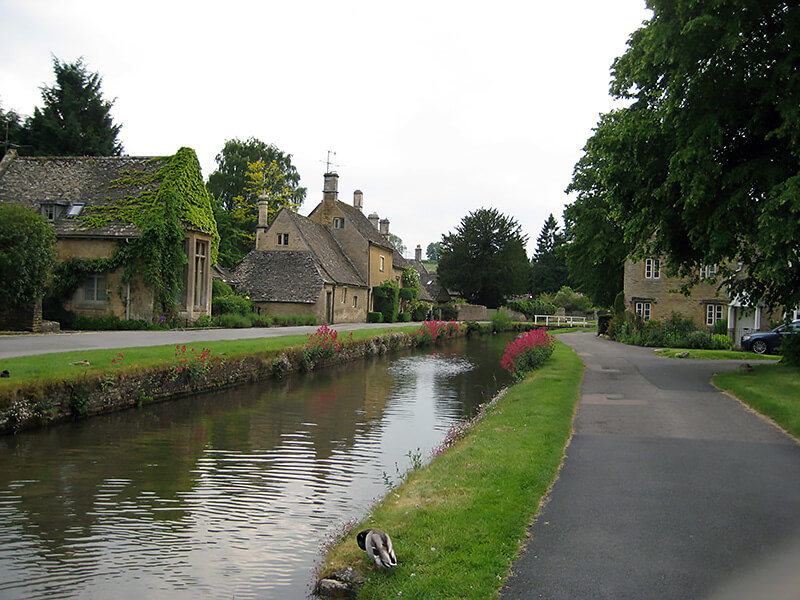Study Abroad at Oxford University, England
A New Education
in a New Country
Article and photos by Kelsey O'Brien

|
|
Oxford's High Street at sunset.
|
Overcoming Preconceptions About England
I remember my preconceptions about England before I traveled across the Atlantic Ocean to London Heathrow Airport. I imagined everyone would be very proper, that I would pick up their accent after a few months, and that Oxford — the university at which I was studying abroad — would be full of people too brilliant to have time to speak with me. Contrary to what many Americans believe, many English are not very proper! The most unexpected moments are where this absence of manners is especially apparent at Oxford, where the students tend to work hard for a few days and then dash off to the pubs and nightclubs to relax. Granted, most of the pub conversations included a lot more philosophy than I was used to hearing in the bars of San Francisco. However, amongst students, these “conversations” often turned into passionate debates, with little concern about what I would consider being polite.
Practical Matters as a Student
I studied abroad for a full academic year at Oxford as a “Visiting Student.” Being abroad for such a long time was great because I had a chance to explore the rest of the country during our long vacations, and I came away from the experience feeling like I had a sense of the diverse cultures within the country. Because I was there for so long, I had to get a UK bank account and a cell phone. These were both pretty easy to obtain. With an official letter from Oxford University saying they had accepted me as a Visiting Student, I could get a bank account with a major multinational bank.
If you are studying abroad anywhere in the UK and plan on taking the train anywhere, even just twice, I would recommend getting a Young Person’s Railcard. It only costs about £30, and will save you a third of the cost of any train ticket you buy for a whole year. The UK is a very student-friendly country. Carry your ID card everywhere, and you will surely save money. Sometimes, even the pubs offer student rates, called “concessions.”
The Challenges of Studying at Oxford
Before I set off to attend Oxford as a student, I was nervous about the workload. While I was excited to learn about living in a new country, I was also there for the education. I knew that there would be the expectation that I write two essays each week, each 2,000 words long, and that I would have to sit down with my tutor for an hour and discuss the arguments I had made in my essay while they questioned me. All of this seemed pretty daunting. Usually, when I turn a paper in at home in the U.S., I hand it to the professor and do not worry about it for another couple of weeks until I get it back with my grade.
Honestly, the workload was not as bad as I had anticipated. I failed to consider that I only needed to be in class for two hours each week (one for each tutorial) and that the rest of the time was mine to finish the reading and writing.
After about two weeks, I fell into the same routine as most students who go to Oxford and Cambridge: get your books three days before the tutorial, read two days before your tutorial, write your essay the night before your tutorial, and go to the pub the night after your tutorial. The tutors were very understanding, and they did not expect the essays to be of the same quality as the ones I used to turn in for my finals. I found that they cared more about teaching me the material and ensuring I understood it than criticizing specific points I had made or trying to debate with me.
Of everything I took away from my study abroad experience, I would say that the education was the most rewarding. Oxford accepts visiting students from all over the world to study for a semester or a year, so if you are interested, visit the their website and talk to your study abroad office to make sure the credits will transfer.
Cultural Immersion in the UK

|
|
Village of Cotswolds in Oxfordshire.
|
The UK is a diverse nation with beautiful countryside and a rich history. Some Americans tend to criticize the people of the UK and Europeans for living in the glories of their past far too much and not embracing the future. Nevertheless, in my opinion, preserving a sense of your nation’s history and culture can be enriching.
Yet, an American student might find many parts of the UK less progressive. London is a cosmopolitan city, but in other parts of the country (such as Oxford), I had not expected to find an undercurrent of values in 21st-century England. As a female, I had to put up with behavior that would have been grounds for disciplinary action at my university — mostly verbal harassment. Another visiting student studying with me was grabbed inappropriately at the dinner table by a native male student, and she asked for the group to sit through a sexual harassment meeting. In these cases, the persons in charge of student welfare were supportive. Yes, this is a cautionary tale; I would still urge students to study in the UK because it has a lot of charm and history. I tried to view some things that might have been offensive to me in America as a simple difference in culture, and that was why I had gone abroad — to learn about a new culture, not to push my views. So, I traveled through the country for a couple of weeks — staying in hostels — and can confidently say that there is no country, including the US, in which I feel safer.
Living and Studying at Oxford
If you are considering studying abroad in Oxford or have already applied to do so, be sure to check out their Oxford University website to familiarize yourself with the colleges. Oxford University comprises almost 40 colleges and halls, more about social support than academic support. If you go to Oxford, you’ll find that some colleges are a bit competitive with one another, especially during “Eight’s Week,” when each college’s rowing team races on the river. Still, camaraderie remains palpable even when walking down the street. Everyone is a student of the University as a whole. Because it is such a big university — with about 20,000 undergraduates — Oxford offers a plethora of clubs and societies in which you can get involved. I highly recommend picking at least one or two, as doing so is a great way to meet other students outside of your college and will save you from drowning in your academic work.
One of the great things about being a “Visiting Student” at Oxford is that you are considered a full-time undergraduate with the same benefits as the other enrolled students. You can use the world-famous Bodleian Library. I never had to spend a penny on textbooks because the library system seemingly holds almost everything published. It’s a “legal deposit library,” meaning it receives a copy of every book published in the UK and Ireland. If they don’t have it, they will order it for you. The history behind the library is fascinating — it has been open to scholars since 1602 — but I enjoyed that only students and faculty of the University are allowed inside. No tourists can go into the reading rooms, and as a student who was only there for the year, I loved being able to flash my ID card and walk right in. The Radcliffe Camera is magnificent and houses many books I needed to read. As a “Visiting Student,” you can also visit the other colleges and halls free of charge (most tourists have to pay a couple of pounds to get in if the college allows visitors at all). Because Oxford is such an old city, its buildings are beautiful and full of historical significance. They have seen the likes of Oscar Wilde, John Locke, Albert Einstein, and countless other brilliant minds. Walking through the same halls, eating at the same pubs, and even walking on the same stones as they did was an experience I never tired of, even after nine months.

|
|
Oxford's outstanding Radcliffe Camera library.
|
Lessons Learned
Having the opportunity to study at such a prestigious institution has given me new confidence as I continue my education. I used to be a shy student who rarely spoke up in class. Still, after my tutorials, I grew accustomed to talking about the reading I had done and sharing my opinion. I also participate in class much more often now. And naturally, going abroad and learning about a new culture is priceless. I am certainly more open-minded now than I was before I went abroad. When I disagree, I always try to consider the other side of an argument. Of course, we inevitably develop opinions as we progress through life. Still, my experience abroad helped me realize that those opinions do not have to define who we are and that there is always room to refine them as we continually enlighten ourselves.
|
For More Information
-
For students looking to take a semester off and interested in working in the UK, look at the Internship with BUNAC in Britain program several friends have used and enjoyed.
-
Getting to Britain can be pretty tough on your wallet. I used StudentUniverse for all of my flights to and from the UK, and found it better than anything I could find on other sites.
-
I traveled alone many times, and use the Hostelworld website religiously.
-
To travel around Britain, I checked for trains on National Rail to travel around Britain because they always offer an up-to-date schedule. You will have to buy your tickets from individual railway companies, or at the train station itself.
-
Another cheap way to travel around Britain is by bus. You can buy tickets to various cities at Megabus.com. Remember to bring your student ID for a discount!
-
If you decide to see continental Europe while you’re away, RYANAIR and easyJET are inexpensive airlines.
|
Kelsey O’Brien is originally from Hermosa Beach in Southern California. She enjoyed her time in the UK so much that she has applied to several universities there for graduate school, and has already been accepted to King’s College, London, to pursue a master’s in English: 1800-Present.
|
